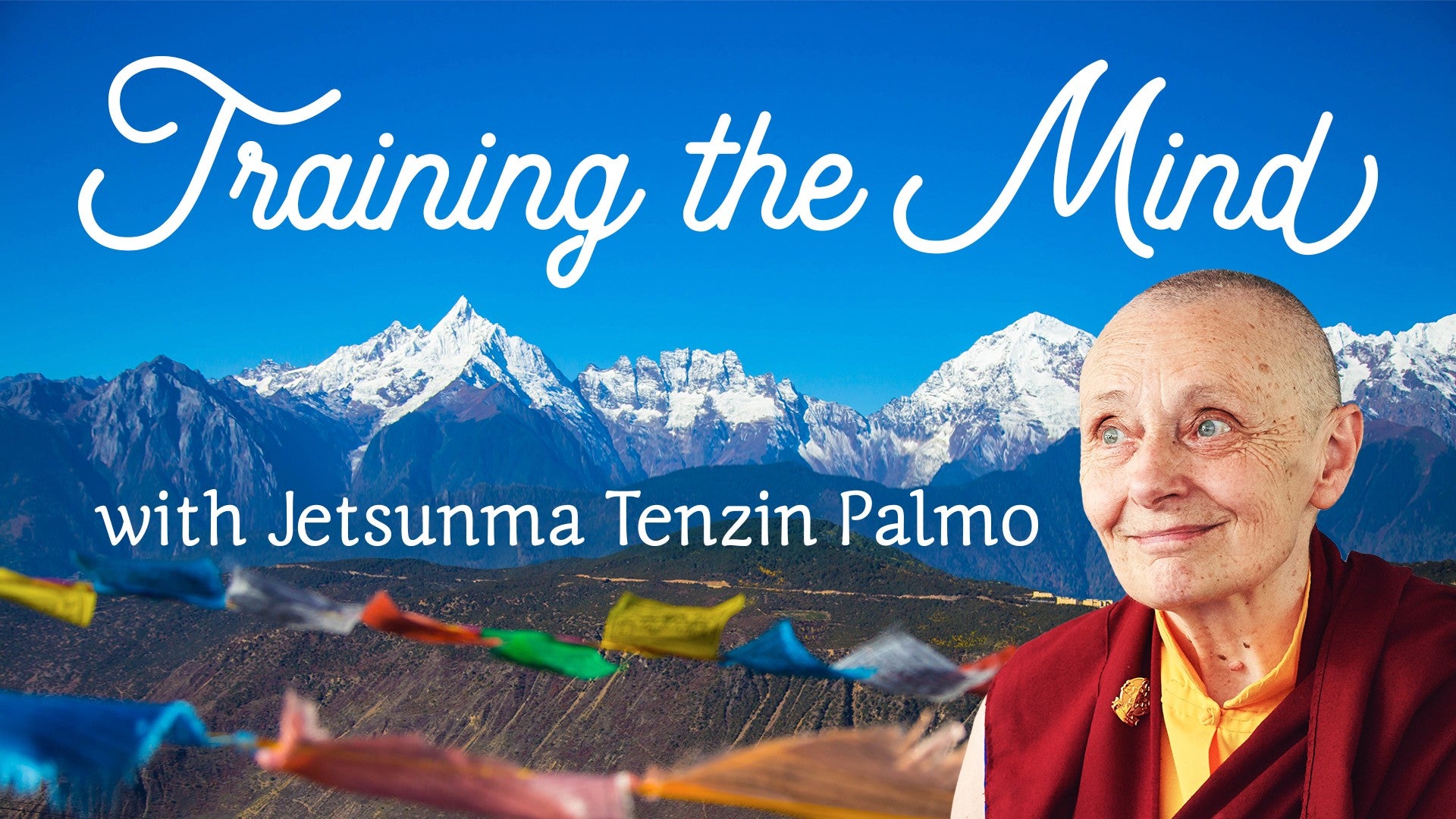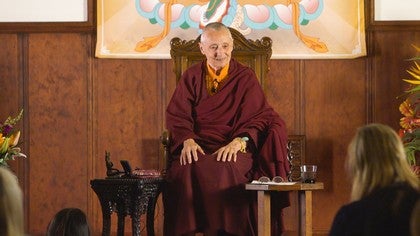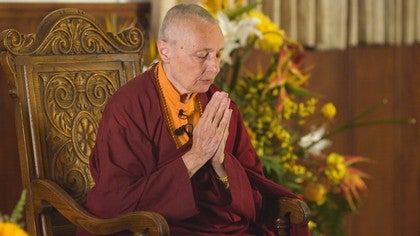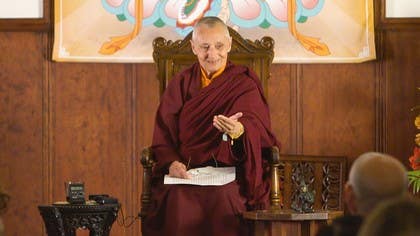Description
About This Video
Transcript
Read Full Transcript
He says the supreme spiritual discipline is to tame one's own mind. And then the supreme great quality is altruism. Altruism means thinking about others. In the Mahayana school of Buddhism, the underlying motivation is considered to be very, very important. Why do we engage in a spiritual path?
So essentially there are three motivations, basic motivations. The first motiva- all of them are good, I mean it's not that one is bad and the others are not good, but that they are of increasing importance, one might say. So the first reason why people engage in spiritual practice, why they take up yoga or tai chi or why they, you know, are careful about being vegan or gluten free and organic, and why they learn how to be more mindful or do, you know, meditation courses, is because of the hope to make this life more pleasant. If my body is healthy, that's nice. If my mind is quiet, that's nice.
I feel better. So we are essentially trying to make this round of birth and death and endless birth and death and birth and death called samsara, we are trying to make samsara comfortable. And for many people this is why they practice, ultimately, because they're hoping that this will make our present life easier. And in the future maybe we can go to heaven or something and that will be even more pleasant. And so if I'm a good girl in this lifetime, then next lifetime should be nice.
And this lifetime should hopefully be better also. So this is the first level of aspiration that we are hoping it is going to make this life and this realm of samsara more comfortable. So to explain this more clearly, I will talk about a dream which I one time had in which I dreamt that I was in prison and everyone was in prison. It was a huge prison and we were all imprisoned. And some people were in the luxury suites in the penthouse apartments, partying and having fun.
And some people all the way down were in the dungeons in endless suffering and despair. And in between some people were working, some people were laughing, some people were crying, some people were hugging, some people were fighting. All different aspects of our human condition. But the one thing we all had in common, we were in prison. And if we were up, there was no guarantee we would not go down.
And if we were down, of course, we could also in time go up. So there was also this underlying insecurity because we never knew where in this huge prison house we would be. And whether we were high or low, we shared our common predicament that we were all prisoners. So the idea that we can make the prison pleasant to stay in is essentially the first aspiration. Right?
Yeah, we're in prison, but it's okay. It's not so bad. This prison. In Buddhist Hindu thought, we are trapped in an endless round of birth, death, rebirth, re-death, endlessly. Why?
Because we are fixated on the idea of an ego, of an eye who is experiencing all these deaths and rebirths and re-deaths, rebirths. So we are trapped here by the fact that we believe in someone who is trapped. Right? Can you understand? So therefore, from a Buddhist point of view, which is shared by the Hindu point of view also, it's an Asian point of view, merely making the prison decorating it nicely and making it look very pleasant doesn't solve the problem because it's still a prison, which means it's very insecure.
We never know what's going to happen. And however much we may be okay now, who knows in the future where we're going to be directed because we have no power to say where we are going to be in this huge great big prison house, up, down, anywhere. So, in the dream, I, recognizing that we were in prison, I said to some friends and people around me, we've got to get out. And they said, oh, it's not so bad. It's okay.
And I said, no, no, it's a prison. We've got to escape. And they said, but nobody gets out. And I said, well, you know, we can try. Let's try to escape.
So most people said it's all too difficult in any way. It's okay. There's no, you know, prison is prison. It's all right. It's not so bad.
But a few friends said, okay, if you try to escape, we will try to escape with you. So I said, right. So going through this prison was a stream. And on the banks of the stream was like a kind of flat boat. And there were also guards.
And I thought the guards would try to stop us, but the guards didn't do anything. They were totally indifferent. So we got on the boat and we swept down from the stream. And we came out at the entrance to the prison. So the prison was like here.
And then there was a road here. So it was running parallel with the prison. So this desire to get out of the prison, to break the wheel of birth and death and rebirth, re-death is the second level of aspiration. I got to be liberated. I have to get out.
In Buddhist terminology, we wish to escape from samsara into nirvana, to be liberated, to be freed, to let down the burden that we are carrying, all of us carrying with us. So this is where I was now. I was running along this path, endlessly running, running, running. And on this side, where all these windows lit up with like vignettes of people drinking, eating, laughing, crying, fighting, working, all different layer after layer of all these windows showing different human activities, some in despair, some enjoying themselves, all different kinds of aspects, but endless. And so I was running and running and running, and I was so tired.
And I thought, yes, it's true, what they say. You can't escape from this prison, because this prison is endless. Even I look like I'm on the outside, but actually I'm just exhausting myself, running, running, running, was the point. And so I thought, okay, I'll go back. And then I thought, ah, but my friends behind me are only running because I am running.
If I go back, they go back, therefore, for their sake, I must keep running. So then I was not running for the sake of liberating myself. I was running for the sake of liberating my friends. And as soon as I thought that, the prison came to an end and the road went in a different direction and the dream went on. But that moment of thinking, I am not running for the sake of myself, I am running for the sake of the others, is the third level of aspiration, which he calls here altruism.
It's when we are not doing our practice purely for the sake of making our life easier or going beyond the round of birth and death, but we are trying to practice in order to be of benefit for others and liberate others. It's rather like if you are, I mean, this is nothing special, I mean, if you want to go to medical school and we go to medical school and we study for so many years to become qualified, it's not with the aspiration that then if I get sick, I can cure myself, right? We want to become qualified so that we can be of benefit for others. We cannot be of benefit for others while we are ignorant of medicine. I mean, I could say, oh, but there are, you know, people say, well, you have to go to medical school for so many years, oh, but that's so selfish.
Because meantime, all these people are so sick and they're suffering. And so then we grab a bag of medicines and maybe a scalpel and rush off with the best of intentions to benefit other beings, but because we ourselves are ignorant of medicine, we give all the wrong medicines and who knows what we do with the scalpel? Best intentions, but ignorant. So first we ourselves have to qualify, then there's going to be endless sick people out there to help. Now we're going to be able to help them.
So this third level of aspiration, which is called bodhicitta, the thought of enlightenment, the spiritual impulse for enlightenment in order to be able to benefit all other beings, is called here altruism. It means, I think it says pensam in Tibetan, means the motivation to be of benefit for others, that we are not living just in order to help ourselves and benefit ourselves, but that we are really aspiring to be of benefit to others. For example, if you're doing yoga, well, we can do yoga in order that we will be very healthy, but also we can have the aspiration to really become extremely skilled in yoga so that we can become teachers and help others also to get the benefits of what we know. And so this is a whole change in motivation. It's not just sort of I will feel better, it's not even sort of I will be liberated, it's so that one can finally be in a position to genuinely be of benefit for others.
The classical example is like if we're all drowning in a swamp, then after a lot of effort finally one finds oneself on dry land, then one turns and all one's family, all one's loved ones, everybody are drowning in that swamp. And then we say, well, so sorry you're all drowning, but I got out, let me be an example. Now you also strive and you can get out too, ciao. We wouldn't do that. We would consider being on dry land with the opportunity to now try pulling everybody else out.
So even in a practical sense, we know that our advantage should be therefore in order to benefit others and not just for our own sake. So this question of what is our underlying motivation for what we are doing, it's very important. It's a whole different shift in why we are practicing, why we want to accomplish for ourselves, for our own benefit, or ultimately for all beings because in the text it goes on about how in endless lives we have been very intimately connected with all beings. All beings have been like our mother. That doesn't go down so well in the West where most people blame their mother for everything.
But in Asia where people appreciate the fact they wouldn't be here if it wasn't for their mother, whatever she might have been like, therefore there is that sense of deep gratitude for the mother and the realization that through endless lifetimes we have all been very intimately connected. All beings have been our mother. So just as we care for the mother in this lifetime, likewise we should have that sense of responsibility for all beings.
Training the Mind with Jetsunma Tenzin Palmo
Comments
You need to be a subscriber to post a comment.
Please Log In or Create an Account to start your free trial.











